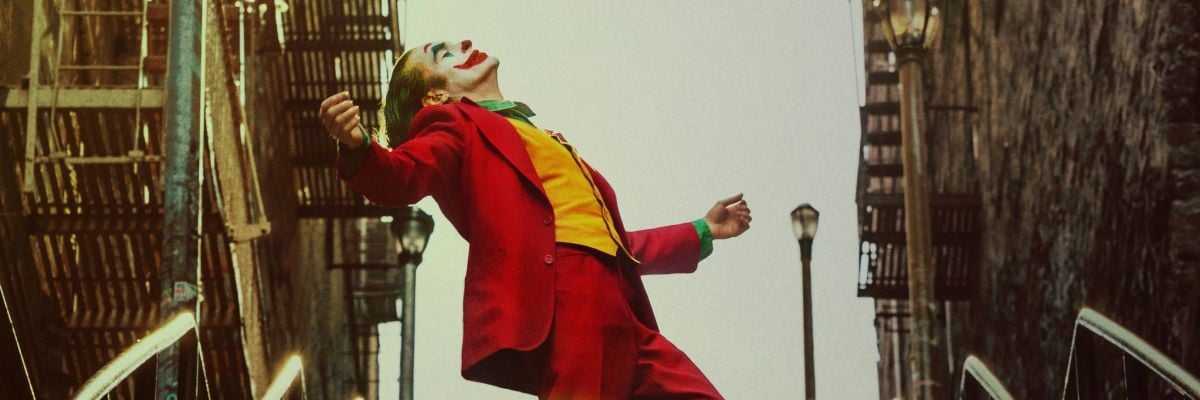
Since it was released six weeks ago, the Joker movie has become the highest-grossing R-rated movie ever, with over one billion dollars in revenue. The movie has clearly struck a nerve in viewers, and it has garnered more than its share of commentary. The reasons for this vary from its gruesome and sadistic violence, to the main character’s unnerving descent into madness, to talk about the likelihood that Joaquin Phoenix, the actor who portrays the Joker, will win the Oscar for his performance.
Not normally one to indulge in pop culture offerings merely for their popularity or shock value, I thought that seeing the film would provide an opportunity for conversation about important things with my students and others. So I went to see it. (Spoiler alert.)
“That sounds like hell!” one of the members of our parish discussion group exclaimed after I gave a general description of the movie the following day. There is something important in that reaction. In a shockingly grotesque way, Joker offers a contemporary verdict on our world that eerily resembles the ancient preacher’s sad declaration: “All is vanity” (Ecclesiastes 1:2).
What you’ve heard about the eerily captivating performance from Phoenix, the artistic crafting of the film, the cinematography, and the like—that’s all true. Whether these redeem the film is another question.
It is hard not to feel sorry for Arthur Fleck, the troubled character who evolves into the Joker. His oddness makes him an easy target for bullies. Indeed, the viewer is led toward a sense of compassion for Arthur due to his troubled family history, his strange relationship with his mother, and the mental illness that causes him to laugh when he is sad.
But Arthur’s transformation into the Joker is wrought through acts that shock even the most hardened movie-watcher. His descent into murderous rage begins with somewhat understandable responses to bullying and progresses to gory assaults against those who merely disagree with him. The movie ends with the Joker dancing through the halls of a mental institution shortly after he meets with yet another mediocre, state-hired counselor—leaving a trail of bloody footprints behind. The viewer is left with a sense that he is being drawn by Arthur ever more deeply into the essence of hell.
The Joker laughs. He laughs a lot. His amusement arises from the emptiness in his troubled soul, yet he has a painted smile on his face, masking a soul that can find no cause for joy.
The same may be said of the Joker’s dancing. His graceful contortions tempt us to admiration even as we are also confused, as with his laughter, by the association of beauty or mirth with the ugliness of his life.
The Joker’s life is built on lies and his own mind generates a world that is also a lie. A turning point for him is discovering his mother’s sordid and disturbing history, leaving a fragile Arthur to realize that what he thought he knew about his childhood was a lie. The pain of this discovery pushes him over the psychological cliff on which he had precariously lived for much of his life.
The few lighter and more consoling moments in the movie revolve around the apparent loving response and acceptance of Arthur’s neighbor. This young lady lives with her child a few doors down from Arthur and his mother. As with so much of Arthur’s miserable life, we discover that this “bright spot” is nothing more than his imagination and, like the all the rest, only yields further ugliness and evil.
Another disturbing tension in Arthur Fleck’s life is the way he hovers over the line between life and death. He regularly contemplates ending his own life, meditating on the gun that he is not supposed to have. The ease with which he takes other’s lives and the despair that characterizes his own reveal the cheap understanding of human existence that the movie embraces. Not only does Arthur waver about destroying himself but he transfers this same ambivalence to the lives of those with whom he disagrees.
The absence of God in the film is, paradoxically, one of its most redeemable aspects. Like Ecclesiastes, it sets before us a shocking and disturbing vision of a mind and a world without transcendence, purpose, or hope. Indeed, there is no basis for hope: Arthur comes from an evil past and becomes a serial killer. Even the world around him is hopelessly infected with the evils of self-centeredness, bullying, deception, and corruption. All work is Sisyphean. What is the purpose of it all if each day is merely a purposeless exertion of energy, pushing the same boulder up the same hill?
Despite ample opportunities to learn the lesson, the real world in which we live has not thought carefully enough about what a world without God is really like.
We cannot live without hope. Lacking hope, we inevitably move toward hell—toward absolute despair. The Joker is so painful to watch because it contains enough truth to show us a future following the turn away from God. Those who don’t believe in God are in no way condemned to enact such depravity, they will rightly remind us. But once God is “dead,” what is the real cause for hope, or the principle around which society can unite itself? For that matter, even if one disagrees with the Joker’s moral vision, what’s really wrong with his visionary approach to remake the world in his image, having left behind archaic Christian notions of good and evil?
The very heart of Catholic Christianity is a hope grounded in the infinitely good God who can bring us to the heavenly home in which we find the peace that nothing in this world can give. Christ’s total gift of himself to his Father did not result in his escape from the horrors of this world’s evils, but those evils were conquered in his resurrection from the dead.
Like the Joker, one can face the evils of this world without God and gradually experience the vacuous and depressing consequences of that choice, or one can understand the evils of our world as perversions, corruptions, and absences of the reality for which we are made. They are signs that we must look beyond to find the answers we really want and need. It is to Christ, our hope, that we must turn (1 Timothy 1:1).
(Photo: Warner Bros. Pictures)



